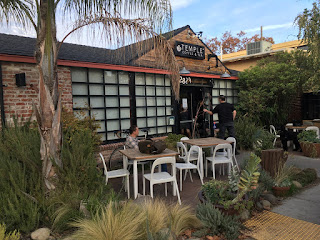Dec. 4, 2017
Last week I had the pleasure of taking a tour of the University of California at Davis with other board members of the
International Women's Coffee Alliance. Six board members were hosted by Dr. Bill Ristenpart, Director of the UC Davis Coffee Center and an endowed professor of chemical engineering, and Sarah Hodge, assistant director of development for the college of engineering.
We started at the large, modern and impressive Robert Mondavi Institute (RMI) for Wine and Food Science. The RMI was designed primarily to support crops and foods grown in California, thus coffee was always left out -- until now. It started in 2013 with 18 undergrad students who signed up for Prof. Bill's first chemical engineering lab called "Design of Coffee." One textbook, one large donation from Chevron and four years later, there are 1,500 undergraduates who go through one of the three sessions of this course every year. Along the way, Dr. Ristenpart and his colleague, Dr. Tonya Kuhl, have found much enthusiasm throughout California's coffee industry as well as unmet research needs.
 |
| Robert Mondavi Institute for Wine and Food Science |
 |
| Cavernous high-bay filled with digitally monitored equipment for wine-making tests. |
 |
| Students learning wine-making at RMI |
 |
| Coffee lab signs in the chem engineering lab windows. |
 |
| Undergrads learning chemistry through coffee. |
For example, a filter company has hired the UC Davis "coffee team" to do a scientific study of the taste differences between coffee brewed using conical vs. flat-bottomed filters. Actually controlling all of the variables to isolate changes in taste due to the filter shape is an incredible job, we found out! A post-doc is spending his days training the recruited tasting volunteers, practicing how he will serve the volunteers the same coffee at the same temperature, brewed in equipment the same in almost every way except the filter.
 |
| Special lighting for the booths where trained coffee tasters will sit. |
 |
| Pass-thru holes in the wall to put fresh-brewed coffee before the tasters. |
 |
| Post-doc explains the rigors of scientifically testing coffee taste differences. |
We were also taken to what will one day be a stand-alone building for the UC Davis coffee center, just as there is a wine and food science building. The coffee building is smaller, but is a beautiful location just the same. Already, there are rooms sponsored by Peet's, Curtis and the Nicaraguan Coffee group. There are large roasters still in crates donated by Probat.
 |
| Donated Probat roasters in crates. |
 |
| 6 IWCA board members and Dr. Bill Ristenpart. I'm 2nd from the right. |
Having just completed my master's degree in coffee value chains at Michigan State University (MSU), I quizzed the chemical engineering professor pretty hard about how well UC Davis could address the socio-economic research issues related to coffee. He indicated they would attempt to fill that part of the research agenda also, but it's pretty clear that is not the strong-point of UC Davis. They are well-suited to provide tasting/sensory, brewing and roasting research. Most likely, Texas A&M will remain the go-to university for coffee bio-agronomy, and most likely, MSU will remain the premier institution for studying agricultural extension and agricultural economics of the coffee value chain. Sustainable livelihoods, equity and food security are all areas of excellence at MSU with dozen of faculty working in developing countries across the globe.
Given MSU's Center for Gender in the Global Context and its ranking as the #1 packaging school, it would be an easy link to include gender studies and coffee packaging science in some future "Coffee Research Center" in East Lansing! Hmm, have to keep these ideas brewing.
Meanwhile, hats off to UC Davis for showing the way and leading the charge to better coffee science!





























